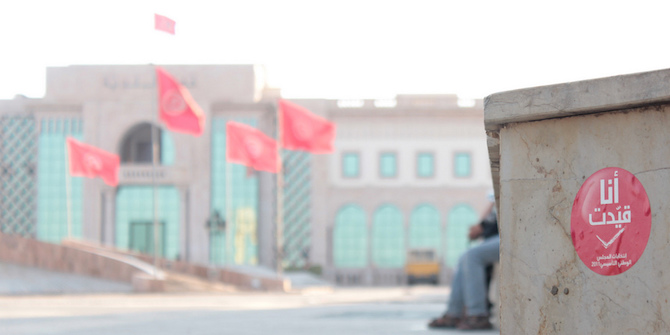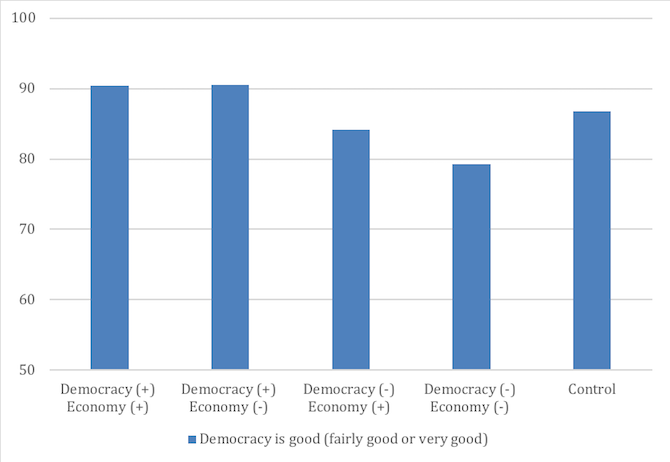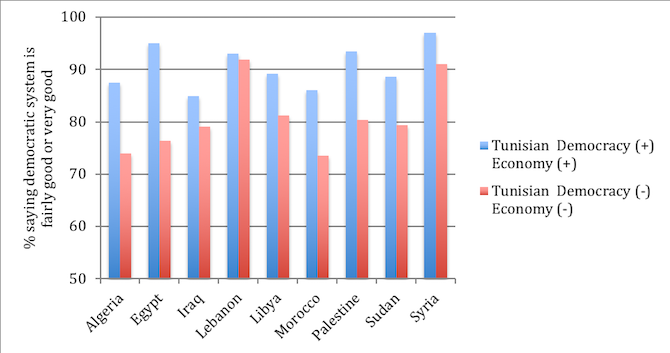by A. Kadir Yildirim and Abdullah Aydogan

As Tunisia is roiled in cabinet shuffle debates and an underperforming economy, a bigger question looms over the region. Can the success of democratisation in Tunisia influence Arab public support for democracy, and possibly lead to the same process elsewhere? The idea of democratic diffusion lies at the centre of debates on how democracy gains greater traction globally. Samuel Huntington’s argument about democratic diffusion in The Third Wave relies on regional contingency factors. Following the Arab Uprisings, many are asking about such diffusion effect. While some believe Tunisia has a potential to create a domino effect in the region, others are more sceptical because of Tunisia’s distinct cultural and political environment.
We conducted an online survey experiment to assess how Tunisia shapes views of democracy. A key motivation was to see whether perceptions of democracy were linked to perceptions of economic conditions. In fact, economic dissatisfaction and demands for economic improvement constituted the bedrock of demands by protesters during the Arab Uprisings as well as protests across the region since then, such as the 2017 Tunisia protests. Likewise, the scholarly literature finds evidence that the economy is a key mechanism shaping individual attitudes toward democracy.
As part of an original public opinion survey conducted in nine Arab countries in Spring 2018 with 7,485 respondents, we randomly assigned respondents into five groups, consisting of four treatment groups and a control. The four treatment groups received, respectively, text referring to (1) the democratic and economic improvements, (2) democratic improvement but economic failure, (3) democratic failure but economic improvement, and finally (4) democratic and economic failure in Tunisia in recent years. After respondents were presented with these texts, we asked them their opinions on democratic governance. The motivating assumption behind this experiment was that favourable views about democracy in one context, i.e. Tunisia, should translate into favourable views about democratic governance in general; by contrast, those individuals who are predisposed toward negative views about the current state of Tunisian democracy should be inclined to express views unfavourable to democratic governance more generally.
The results indicate that respondents who were provided with texts outlining a positive democratic and economic outlook in Tunisia expressed higher rates of approval of democracy than those who were exposed to political texts that featured Tunisia’s democratic and economic failures; the effect being particularly pronounced in North African countries.
Specifically, Figure 1 shows that 90 percent of respondents who received the first text (i.e. which outlined that Tunisia’s democracy and economy had been doing well since the beginning of the Arab Spring protests) believed that a democratic system is ‘very good’ or ‘fairly good’ for their own country, while only 79 percent of those who received the fourth text (i.e. Tunisia’s democracy and economy failed) believe a democratic system is ‘very good’ or ‘fairly good’. Comparing the third and the fourth bars in Figure 1 suggests that, in case of a democratic backslide in Tunisia, support for democracy in the region is 5 percent less subject to a condition of economic failure (79 percent) than it is in a condition of economic success (84 percent).

While the aggregate effect might not seem sufficiently large at first, we find significant cross-country variation. Respondents in North African countries such as Algeria, Egypt and Morocco were most sensitive to the state of democracy in Tunisia (Figure 2). 95 percent of respondents in Egypt who were exposed to the texts detailing democratic and economic successes thought that democracy is ‘very good’ or ‘good’ whereas only 76 percent of the Egyptian respondents had a favourable view of democracy in a scenario where Tunisian democracy and the economy perform poorly.
On average, we find that the differential effect of exposure to different texts on Tunisia doubled in North African countries as opposed to other countries in the region, from 6 to 13 percent. Lebanon was the country where the texts had the lowest impact on support or opposition to democracy. We attribute this finding to the Lebanon’s relative democratic history compared to the other countries in the list.

Implications
There are two major implications of our findings. On one hand, the success of a new democracy impacts upon public opinion vis-à-vis democracy in other countries in the region. It should also be noted that geographic proximity makes a difference. Countries that are geographically close to the successful example of democratisation will feel the democratic diffusion effect stronger than countries farther away. In this regard, the future of democracy in Tunisia might have a significant role in the future of democracy in the rest of the region. A possible future failure of the Tunisian experience may create a wave of dissatisfaction with democracy across the region, leading to notable levels of decrease in support for democracy.
On the other hand, our results show that perceptions of democracy are contingent on economic performance. Survey respondents associated their evaluation of democratic governance with economic performance. When the economy performs well, respondents tend to associate positive views with democracy; otherwise, perceptions of democracy suffer. For a new democracy like Tunisia, economic performance can become the crucial yardstick with which citizens judge the merits of democracy. As public opinion surveys and more qualitative analysis previously have shown, lacklustre economic performance undermines trust in democratic institutions.
There is a clear policy implication. Democratic diffusion rests on the success of new democracies in the region and economic success is indispensable to democratic success. Economies of new democracies such as Tunisia should be deemed as important as the establishment of democratic practices during the transitional phase. Economic aid packages should not only aim to deliver short-term stabilisation measures but also pave the way for more tangible outcomes, including but not limited to job creation and economic growth. Crucially, the impact of policies to improve economic performance of a new democracy is not limited to the transitioning country; they help shape perceptions of democracy in neighbouring countries as well. Therefore, investment in nascent democracies in a democracy-poor region such as the Middle East can go a long way in entrenching democracies and diffusing democratic governance.
A. Kadir Yildirim is a Middle East Fellow at Rice University’s Baker Institute for Public Policy focusing on religion, politics and the politics of the Middle East. He tweets at @akyildirim
is a Middle East Fellow at Rice University’s Baker Institute for Public Policy focusing on religion, politics and the politics of the Middle East. He tweets at @akyildirim
 Abdullah Aydogan is a lecturer of political methodology at Columbia University’s political science department and a research scholar at Rice University’s Baker Institute for Public Policy, focusing on democratisation and political institutions in the Middle East. He tweets at @abdaydgn
Abdullah Aydogan is a lecturer of political methodology at Columbia University’s political science department and a research scholar at Rice University’s Baker Institute for Public Policy, focusing on democratisation and political institutions in the Middle East. He tweets at @abdaydgn






